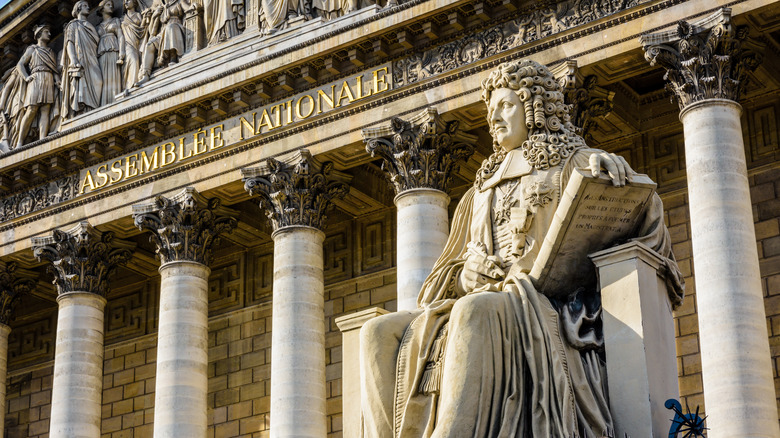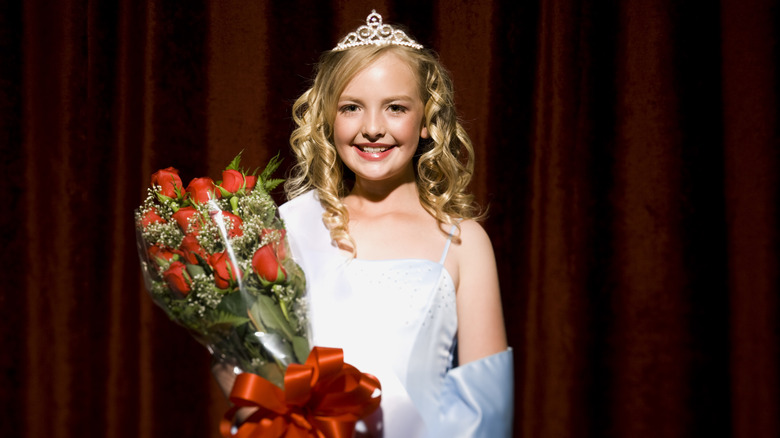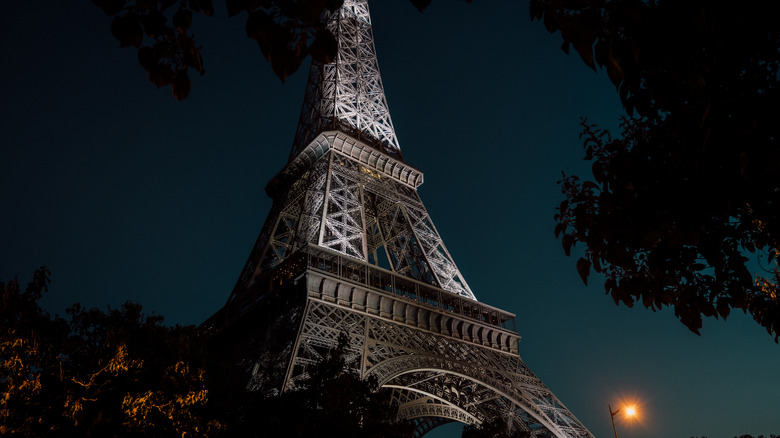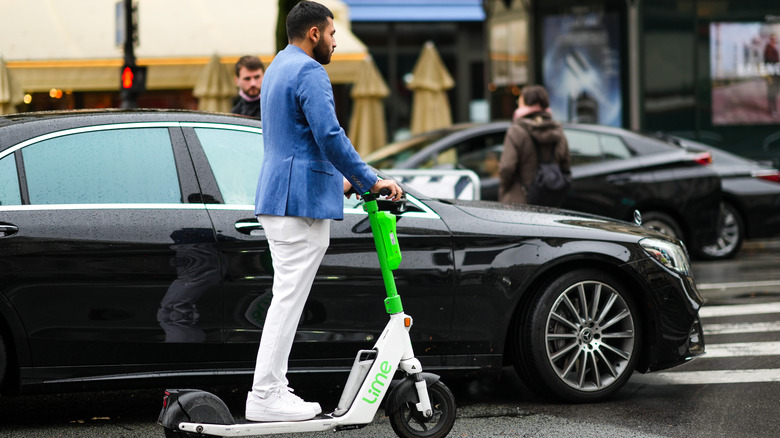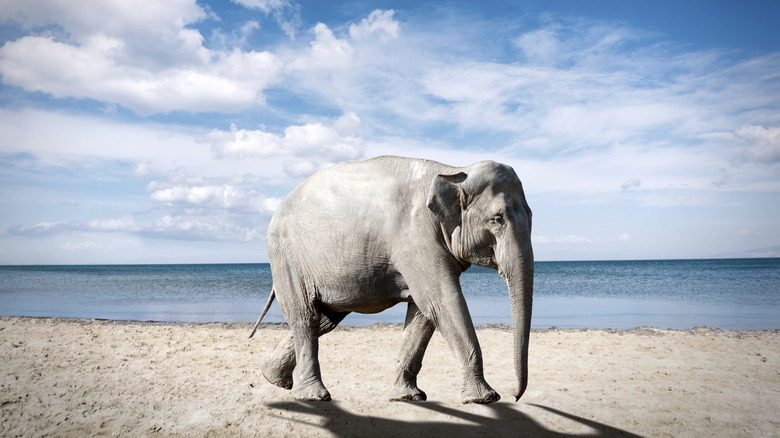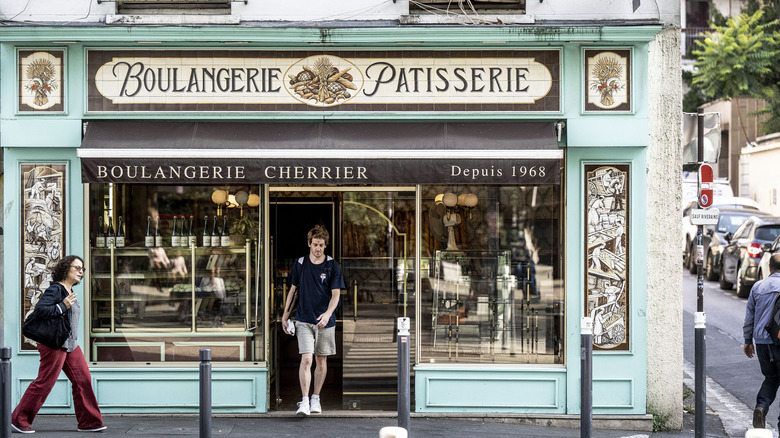Bizarre Rules You Have To Follow In France
France is a fascinating place to visit with a wealth of interesting foods to try, impressive iconic landmarks, must-see castles, and a rich cultural heritage. It also has some peculiar rules and customs that add to its intrigue. From antiquated decrees that date back to the times of Napoleon to modern rulings that have caused some controversy, there are several bizarre rules you have to follow in France that may leave you scratching your head. Strange as they are though, it's important to be aware of them so that you don't find yourself running into trouble.
Prior to 1804, there was no single set of laws in France. That all changed with the French Revolution and the introduction of the Napoleonic Code, a unified civil code for all. Much of the French Civil Code hasn't changed much since that time, which is why you find some oddly outdated laws in France. Then there are the newer decrees that have been put in place to avoid modern problems such as alien invasions, electric scooter-related deaths, and the Americanization of school children. These laws may seem odd or even comical to outsiders, but they're real and enforceable. Here are some of the strangest.
It is illegal for UFOs to take off, land, or fly over Châteauneuf-du-Pape
If you're planning a wine vacation in France, Châteauneuf-du-Pape is a lovely spot that is renowned for its bold red wines. It's also known for a very bizarre law pertaining to alien spacecraft. There is an ordinance in place that prohibits flying saucers or "flying cigars" from taking off, landing, or flying over the town. Should a UFO land in Châteauneuf-du-Pape, the officials can immediately take it into custody. The law was passed in 1954, and it still stands today.
The origins of the law can be traced back to 1953, when the movie "War of the Worlds" was released. The movie sparked a spate of UFO sightings across France. The mayor of Châteauneuf-du-Pape saw this as an opportunity to put a spotlight on his village, so he drafted and passed the law on October 25, 1954. Current mayor Claude Avril has stated he will not repeal the law. He told France Bleu, "I won't touch it. It's good to spice things up with a fun attitude. We're creating a buzz in a friendly way. No one is fooled."
You can't name your child whatever you want
France has had a long history of baby-naming laws. In 1803, Napoleon Bonaparte enacted a law stating that children could only be named French Christian names. It wasn't until 1966 that parents were given a little more leeway and legally permitted to give their children foreign, regional, and mythical names. In 1993, parents were finally given the right to name their children whatever they wished ... as long as the name was in the best interest of the child.
As it stands today, the French authorities can step in and deny a child's name if they believe it could be detrimental to the child. In these cases, the court can order the parents to choose a more suitable name for their child. Want to name your child Mini Cooper? Sorry, that won't fly. How about Nutella? Nope, that won't work either. Some other names that have been forbidden include Dameon, MJ (in honor of Michael Jackson), and Prince William. In many cases, the judges ruled against the names because they believed the child could be ridiculed.
Ketchup is not allowed in French schools
What kid doesn't love ketchup? Unfortunately, school children in France can't slather their lunch in the tangy, sweet condiment. In 2011, the French government implemented a law stating that sauces like ketchup, mayo, and vinaigrette can only be used sparingly in school cafeterias. The sauces cannot be readily available, and can only be served with certain dishes. However, in a very French move, they stated that bread must be freely available.
According to the L.A. Times, there are two reasons for the no-ketchup ruling. The first is that it promotes healthy eating. In an appendix to the decree, there are rules on how often school catering services can serve dishes that contain products that are high in fat and sugar. There are also guidelines for how many meals must be served with vegetables, fruit, dairy, and protein. The second reason is to protect French culinary heritage. Christophe Hebert, chairman of the National Association of Directors of Collective Restaurants, told the Times of London, "Canteens have a public health mission and also an educative mission. We have to ensure that children become familiar with French recipes so that they can hand them down to the following generation."
Child beauty pageants are outlawed
Pageant parents be warned — beauty pageants for children are an absolute "non" in France. In 2014, the government passed an amendment to a law on women's rights that banned beauty pageants for children under 13. The rationale behind the law is to prevent the hyper-sexualization of children. As Chantal Jouanno, author of the amendment, told the Associated Press, "We are talking about children who are only being judged on their appearance, and that is totally contrary to the development of a child."
Anyone who enters a child under 13 in a beauty pageant or organizes a child beauty contest themselves can now face steep fines of up to €30,000 (about $32,400) or two years in jail. In addition, beauty pageants for children aged 13 to 16 are highly regulated. Article 58 of the law states, "Any person who organizes a competition for children under 16 based on appearance must obtain prior authorization from the State representative in the department. Only competitions whose organizational arrangements ensure the protection of the best interests of the child and their dignity may be authorized."
It's illegal to take photos of the Eiffel Tower at night
The Eiffel Tower is easily one of the most photographed landmarks in all of France. It's an impressive sight during the day, and even more spectacular at night when it sparkles with glittering lights. One of the most important things you should know before visiting the Eiffel Tower though is that it's illegal to post your nighttime Eiffel Tower photos in any professional way. That's because the tower's lights are protected by copyright. According to Snopes, the tower is public domain, but the lighting is considered an artistic work and therefore is protected by European copyright law.
Now, before you start freaking out about those nighttime Eiffel Tower posts on your Instagram feed, here's what the official Tour Eiffel site says: "Photographing the Eiffel Tower at night is not illegal at all. Any individual can take photos and share them on social networks. But the situation is different for professionals. The Eiffel Tower's lighting and sparkling lights are protected by copyright, so professional use of images of the Eiffel Tower at night require prior authorization and may be subject to a fee. Professionals should therefore contact the Eiffel Tower's management company to learn about conditions for using the images depending on the case."
Employees are forbidden from eating at their desks
Shoveling food into your face as you frantically fire off emails is not allowed in France, and that's probably a good thing. Article R4228-19 of the French Labor Code states, "It is prohibited to let workers have their meals in the premises assigned to the work." If you've taken a job in France or plan on doing business during your time there, you'll have to leave the office to grab a bite. It's a great excuse to get some fresh air and indulge in some fabulous French food at a bistro or boulangerie.
According to food historian Martin Bruegel, the law was enacted in 1894 as a public health measure. He told NPR it was a way to get people out of the unsanitary workplaces and air out the spaces while they were gone. Eventually, leisurely lunches became ingrained in French culture. The law was briefly repealed during COVID-19, but came back into effect in 2022. Many people believe it should be back to stay. Bruegel points to the fact that lunch breaks increase productivity in the latter part of the day. He also told NPR, "People are just simply happier when they take some downtime during the workday. It's good for their well-being."
Parents and grandparents can legally oppose marriages
If you're planning on marrying your French partner, you may want to hold off on mapping out your wedding and choosing your ultimate honeymoon destination until you're absolutely sure their family approves of the marriage. If they don't, your wedding dreams could be dashed. According to Article 173 of the Civil Code, "The father, the mother, and, in the absence of a father or mother, the ancestors may oppose the marriage of their children and descendants, even adults."
As if that wasn't bad enough, there are cases where other family members and even non-family members can get involved. The law states that in the absence of parents or grandparents, an older sibling, aunt, uncle, or cousin can step in and oppose the marriage. In some cases, a tutor or curator can file an opposition. In the end, it's all up to the public prosecutor to decide whether the celebration can take place. The only good news is that if the opposition is rejected, the opponents may have to pay damages.
You can't ride an e-scooter in Paris
In 2018, Paris became the first city in Europe to allow shared, stand-up electric scooters in the city. Riders could download an app to locate the scooters, pay a fee to unlock them and ride them, and then leave them for someone else whenever and wherever their ride was done. However, on September 1, 2023, Paris also became the first European city to officially ban e-scooters. An overwhelming 90% of the people who voted opted for the ban.
According to the BBC, safety concerns were the main reason for the ban. The media outlet reported that in 2022 alone there were 459 injuries and three deaths from e-scooter accidents. The Guardian also cited the mess that the scooters made, referring to it as "city streets being clogged up by parked scooters toppled into heaps." You may not be able to grab an e-scooter anymore to go short distances in the city, but that may be for the best. Walking is still one of the best ways to get around Paris, as you can take in all the sights at a leisurely pace. Public transportation is another convenient option if you're stretched for time or have longer distances to go.
Elephants cannot bathe on the beach in Granville
Granville is an underrated tourist destination in France that has beautiful beaches, a medieval Upper Town, and a museum devoted to French designer Christian Dior. It also has a bizarre rule stating that no elephants are allowed to bathe at the beaches. To be fair, the rule applies to all animals, but it was created specifically with elephants in mind. Why, you might wonder, would elephants even be in Granville in the first place? It all stems from the circuses that would roll through during the summer months.
In 2009, Reuters reported that officials in Granville had imposed the ban due to events that had taken place the year prior. According to the article, the circuses that visited the town had previously been allowed to take elephants to the beach to swim in the ocean. Unfortunately, health inspectors raised the alarm about traces of elephant droppings in the water. Therefore, the town decided to prohibit animals from entering the water to avoid contamination and potential beach closures. If you're traveling with a pachyderm in tow, you won't be able to take it into the water. Dogs, however, are welcome on several of Granville's beaches.
Parents cannot disinherit their children
No matter how strained relations may be between parents and their children in France, parents are still legally obligated to leave their children a portion of their estate. It's called an "inheritance reserve," and the percentage of the estate varies depending on how many children the parent has. Children can renounce the inheritance if they choose, but parents are locked in from the day the child is born.
France's forced heirship law made international news when French singer Johnny Halladay passed away in 2017, and it was revealed he cut his two eldest children out of his will. The singer had a house in L.A. and spent a considerable amount of time there before his death. He wrote his will in California, which stated that his entire estate was to go to his fourth wife Laeticia. Johnny's two eldest children contested the will, saying it contravened French law. According to France 24, Laeticia and the two older children eventually reached a settlement in 2020.
You must be polite while in the Lhéraule town hall
Civil servants often bear the brunt of people's frustrations. Not so in the small commune of Lhéraule in France's Oise department. In 2012, the mayor of Lhéraule made an official decree that people must be polite and respectful when in the town hall. This includes saying "bonjour," "au revoir," and "merci." If you don't abide by the rules, you may be asked to leave. The only exception is on days where one might be particularly stressed out like a wedding day or election day.
The West Observer reported that Mayor Gérard Plée issued the decree after becoming exasperated with the way some people behaved when visiting the town hall. His order states, "Users of the town hall of Lhéraule are required to comply with the observation of social standards of politeness and courtesy ... in particular to greet the people present when they enter the premises." As of 2022, the decree was still in effect.
French bakers must close shop at least one day a week
The French take their bread very seriously. In nearly every city, town, and commune you visit, there will be at least one bakery serving freshly baked goods like baguettes, brioches, and pastries. So beloved are boulangeries that there are laws in place to prevent bakers from burning out. Many regions in France have strict labor laws that require bakeries to close for a full 24 hours every week. Bakers who don't take their obligatory day of rest can face penalties.
In 2015, France 24 reported that an award-winning baker in Saint-Paul-lès-Dax was forced to close his shop for one day every week after the authorities discovered he was operating seven days a week. The Guardian reported another case from 2018 where a baker in Lusigny-sur-Barse stayed open all week long during the summer tourist season and was ordered to pay a €3,000 ($3,280) fine. In 2021, a baker in a Paris suburb flouted the law and was ordered to inform the court of his chosen day of rest or face €1,000 ($1,093) a day in fines, according to The Local.
Loose-fitting or baggy swimming trunks are forbidden
If you're planning on swimming in a public pool in France, make sure you bring the right swimwear. And by right, we mean tight. There is a unique swimsuit law you have to follow in France that states men cannot wear baggy or loose-fitting swim trunks. The appropriate swimwear can only be form-fitting trunks or briefs (aka Speedos). The reasoning behind the law is that baggy or loose-fitting swim trunks can bring debris into the water, therefore they are unhygienic.
Some places also require swimming caps for similar reasons. This could even apply if you have short hair or are bald. Anne Ditmeyer of Prêt à Voyager says, "In fact, some lifeguards will yell at you for not wearing a cap if you are bald or have a shaved head. Furthermore, you are more likely to be yelled at by a lifeguard for not wearing a cap — or not showering — than for running, jumping on someone, or taking up the entire lane. The French take swim caps very seriously."
